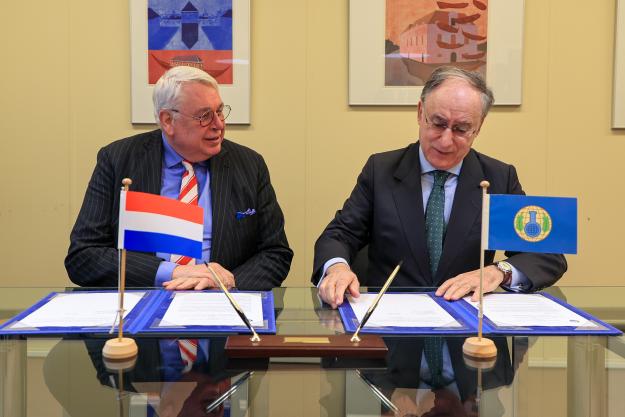
THE HAGUE, Netherlands—20 December 2024—The Government of the Kingdom of the Netherlands has made a voluntary contribution of €500,000 to the Organisation for the Prohibition of Chemical Weapons (OPCW) to support its activities related to Ukraine. The contribution will be allocated to the Trust Fund for the Implementation of Article X, Assistance and Protection programmes earmarked for activities related to Ukraine.
The contribution will be used to strengthen the capacity of Ukrainian first responders, through providing technical expertise and trainings, to effectively address chemical emergencies, including to investigate any potential use of toxic chemicals as a weapon.
The voluntary contribution was formalised on 10 December 2024 in a signing ceremony held between the Ambassador, Permanent Representative of the Kingdom of the Netherlands to the OPCW, H.E. Mr Henk Cor van der Kwast, and the OPCW Director-General, Ambassador Fernando Arias, at the Organisation’s Headquarters in The Hague.

H.E. Mr Henk Cor van der Kwast, Permanent Representative of the Netherlands to the OPCW, and Ambassador Fernando Arias, OPCW Director-General, formalise The Netherlands’ voluntary contribution to support the OPCW’s assistance activities.
Ambassador van der Kwast noted: “The Netherlands is determined in its support for Ukraine and contributes this year again to the Trust Fund for the Implementation of Article X,” highlighting the importance of the assistance and protection programme.
Director-General Arias expressed his sincere gratitude to Ambassador van der Kwast, stating “This new voluntary contribution demonstrates again the Netherlands’ steadfast commitment to upholding the norms and principles of the CWC. Such supports are essential in strengthening our shared mission to maintain a world free of chemical weapons. The Secretariat stands ready to assist member states in accordance with its mandate under the convention to address the re-emergence of chemical weapons.”
Background
The Kingdom of the Netherlands has been an active member of the OPCW since the Chemical Weapons Convention entered into force in 1997. To date, the Netherlands has made over €8 million in contributions to various OPCW funds including the Trust Fund for OPCW Conference of the States Parties and Special Sessions Meetings and the Trust Fund for the Implementation of Article X.
Article X of the Chemical Weapons Convention (CWC) provides for assistance and protection to a State Party if it is attacked or threatened by chemical weapons. Through the relevant Trust Fund, the OPCW Technical Secretariat has provided support to Ukraine, upon its request, to strengthen its preparedness and response capabilities against chemical weapons threats. These efforts included deployment of the Technical Assistance Visits, provision of protective, detection, and identification equipment and training Ukrainian first responders and experts.
Since February 2022, States Parties have contributed at least €4.52M in voluntary contributions to a Trust Fund on Assistance and Protection of Ukraine to support capacity building activities.
In 2024, the Technical Secretariat deployed several Technical Assistance Visits (TAVs) to Ukraine, upon its request and supported in strengthening the country’s capacity and preparedness for prevention and protection in respect to chemical weapons related incidents. Additionally, 60 Ukrainian experts were trained in sampling and detection techniques at the OPCW Centre for Chemistry and Technology, and 60 Ukrainian first responders participated in online specialised training on emergency response to the use of toxic chemicals.
As the implementing body for the Chemical Weapons Convention, the OPCW, with its 193 Member States, oversees the global endeavour to permanently eliminate chemical weapons. Since the Convention’s entry into force in 1997, it is the most successful disarmament treaty eliminating an entire class of weapons of mass destruction.
In 2023, the OPCW verified that all chemical weapons stockpiles declared by the 193 States Parties to the Chemical Weapons Convention since 1997 — totalling 72,304 metric tonnes of chemical agents — have been irreversibly destroyed under the OPCW’s strict verification regime.
For its extensive efforts in eliminating chemical weapons, the OPCW received the 2013 Nobel Peace Prize.
More Information
